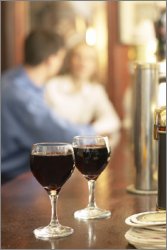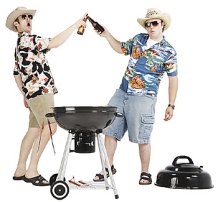How True IS the Phrase 'In Vino Veritas' ('In Wine There Is Truth')?
by www.SixWise.com
There is an old Latin phrase that suggests people are more
likely to say what they're really thinking when they're under
the influence of alcohol: "In Vino Veritas," or
"In Wine There is Truth."
Clearly, alcohol does cause us to lose our inhibitions, either
in a pleasant, getting to know your neighbor better kind of
way, or in an unpleasant, dancing on the bar kind of way.
Mel Gibson would certainly fall into the latter category,
and it's the anti-Semitic comments he made while inebriated
that have prompted many to wonder: Does alcohol really act
as a truth serum?
|

Alcohol can make you say things you shouldn't, but
most experts say not things you don't mean.
|
Is Alcohol the Ultimate Lie Detector?
The general consensus from experts is that while alcohol
may loosen a person's lips to the point where they'll say
something they regret, it cannot conjure up thoughts that
weren't already there, somewhere.
"We don't think thoroughly about what we are saying
when we are intoxicated," said Dr. Alberto Goldwaser,
a forensic psychiatrist and professor of psychiatry at NYU
medical school. "But that doesn't mean we don't believe
what we are saying. At that moment, we really believe it."
And our convictions carry through, even after the drinks'
effects wear off.
"We still mean it the next day," Goldwaser says.
"The next day, we say, 'I never meant to say it.' Not,
'I never meant it.' "
|

Alcohol dampens brain function in all areas of the
brain, a University of Chicago study found.
|
One could make an argument that alcohol can, perhaps, artificially
intensify feelings, making a person feel overly emotional
and lash out about an issue that normally would not affect
them.
"What we can say is that alcohol has an effect on inhibitions
and that, normally, people will repress certain comments because
they are not socially acceptable, but alcohol can take away
that inhibition," says Harriet de Wit, a professor of
psychiatry at the University of Chicago who directs the university's
Human Behavioral Pharmacology Laboratory.
She conducted a study that found consuming alcohol "basically
dampened brain function in all areas of the brain."
So while alcohol can lead a person to say things that are
on their mind, but that they normally would keep to themselves,
it may not be the ultimate judge of the truth.
" ... I wouldn't want to give the impression that
everything a person says when they are inebriated is exactly
what they would think in a rational state of mind," said
Dr. Mark Levy, a forensic psychiatrist and a professor at
University of California, San Francisco.
A Better Measure: "Bekoso, Bekiso, Bekaso"?
Perhaps a more telling measure of a person's character can
be found not from his drunken rants, but rather from the Hebrew
phrase "bekoso, bekiso, bekaso." It says that you
can get to know a person's real character by these three simple
measures:
-
Bekoso: By their cup, or how he or she acts when drunk
-
Bekiso: By their pocket, or how he or she manages money
-
Bekaso: By their temper, or how he or she acts when angry
So if alcohol isn't a clear measure of truth, then what is?
It seems we all have our own ideas:
-
"Truth is not merely what we're thinking, but also
why, to whom, and under what circumstances we say it,"
said former Czech president Vaclav Havel.
-
"When you have eliminated the impossible, whatever
remains, however improbable, must be the truth,"
said Sherlock Holmes' author Arthur Conan Doyle.
-
"The truth is rarely pure, and never simple,"
said poet and playwright Oscar Wilde.
Recommended Reading
The
Top Seven Signs That Someone is Lying to You
Alcohol
Consumption -- How Much is Too Much and Too Little?
Sources
Chicago
Tribune August 4, 2006
The
Seattle Times August 13, 2006
Chicago
Tribune August 24, 2006